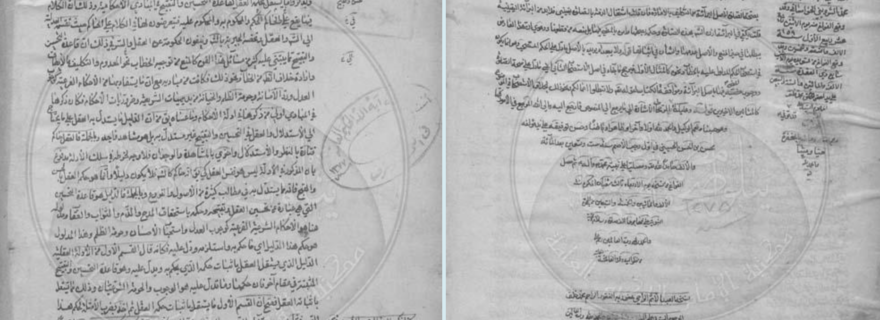Seeking (or Not Seeking) Clarification: Introducing al-Wāfī fī sharḥ al-Wāfiya of al-Aʿrajī (d. 1227/1812)
Suppose someone had come to the Prophet during the month of Ramaḍān and said, "I broke my fast." Suppose further that the Prophet had simply replied, "Offer expiation." Given that one's fast can be broken in several different ways (including eating, drinking, having sex, intentionally vomiting, etc.), what can we infer from the Prophet's answer? This is the crux of the matter discussed under the rubric "Tark al-istifṣāl fī ḥikāyat al-ḥāl maʿa qiyām al-iḥtimāl" – an elaborate section title that can be translated as “Refraining from seeking clarification as recorded in a situation where there was a possibility of ambiguity”. The discussion is normally found in the chapter on the universal and the particular (al-ʿāmm wa-l-khāṣṣ) in Islamic legal theory.
Our contribution to the volume comes from a commentary titled al-Wāfī fī sharḥ al-Wāfiya by the scion of a legendary family of Iraqi sayyids: Muḥsin b. al-Ḥasan al-Aʿrajī (d. 1812), also known as al-Muḥaqqiq al-Kāẓimī (not to be confused with Asad Allāh b. Ismāʿīl al-Tustarī [d. 1819 or 1821], the author of Kashf al-qināʿ). A sharp critic of Akhbārism, al-Aʿrajī is counted among the foremost champions of Uṣūlism in the eighteenth century. The original text, al-Wāfiya fī uṣūl al-fiqh by al-Fāḍil al-Tūnī (d. 1660), contains one of the earliest responses to Muḥammad Amīn al-Astarābādī's (d. 1626) devastating criticism of developments in Twelver Shīʿī law since Ilkhānid times.
Coming back to the scenario described earlier: simply because the Prophet (or any irreproachable authority [maʿṣūm] for that matter) did not seek clarification (e.g., by asking “How did you break the fast?”), can we infer that one must offer expiation irrespective of how one broke the fast? According to giants of the discipline, like al-Shāfiʿī (d. 820), al-Sharīf al-Murtaḍā (d. 1044), and al-Ghazālī (d. 1111), the answer is “yes” – unless, that is, there is a strong possibility that the scenario in question (e.g., I broke my fast) pertained to something in particular (e.g., eating). Fakhr al-Dīn al-Rāzī (d. 1209) introduced another important consideration into the debate: was the Prophet aware of the specific incident? If so, then his answer cannot be generalized. Al-Aʿrajī's commentary fleshes out additional implications of the nature of the question, the nature of the answer, and the Prophet's knowledge of the incident.
Al-Wāfī attests to the fact that al-Aʿrajī's title "al-Muḥaqqiq" was well-deserved. Wisnovsky (2013) has noted that there is a "spectrum of taḥqīq" which includes those who felt "commentators are obliged to defend the doctrines articulated in the core text," as Naṣīr al-Dīn al-Ṭūsī (d. 1274) did vis-à-vis Ibn Sīnā (d. 1037), as well as those who felt taḥqīq "included testing the validity of the author's theories," as Fakhr al-Dīn al-Rāzī did. In his commentary on al-Wāfiya, al-Aʿrajī seems to fall on al-Ṭūsī's side of the spectrum: he is more interested in synthesis than critique, even when he is discussing Sunnī opinions. Whether or not this is true of early modern Twelver Shīʿī uṣūl al-fiqhgenerally is something the readers of this volume will have to determine for themselves, but al-Aʿrajī's discussion of "Refraining from Seeking Clarification" suggests Twelver Shīʿī authors viewed themselves as participants in a broader Islamic legal tradition.
References:
Robert Wisnovsky, “Avicennism and Exegetical Practice in the Early Commentaries on the Ishārāt,” Oriens 41 (2013): 349–378.

